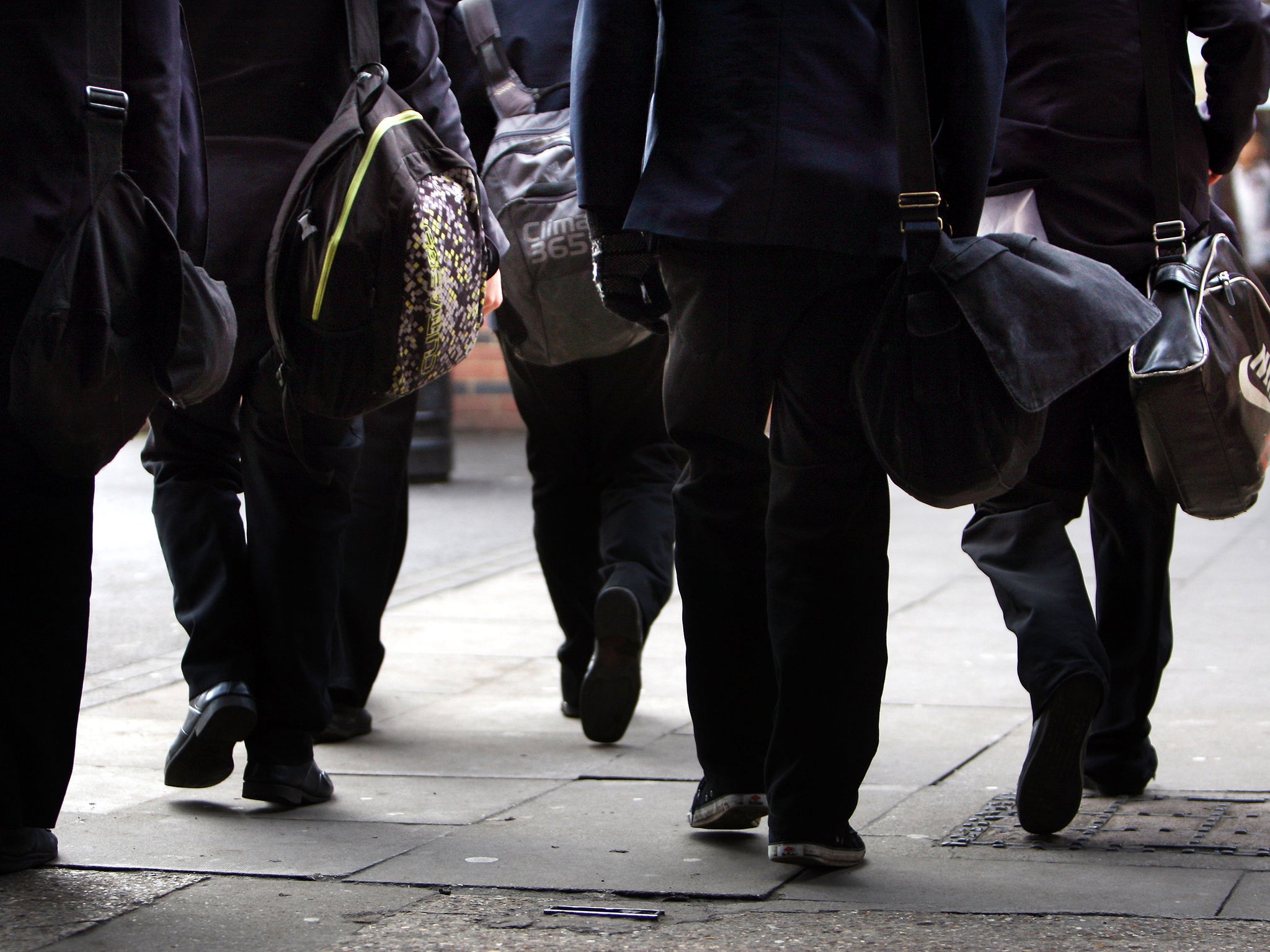Teachers blame obsession with exams as number of pupils being expelled soars
Latest figures show 35 pupils a day being expelled, and those with special educational needs are seven times more likely to be banned

Your support helps us to tell the story
From reproductive rights to climate change to Big Tech, The Independent is on the ground when the story is developing. Whether it's investigating the financials of Elon Musk's pro-Trump PAC or producing our latest documentary, 'The A Word', which shines a light on the American women fighting for reproductive rights, we know how important it is to parse out the facts from the messaging.
At such a critical moment in US history, we need reporters on the ground. Your donation allows us to keep sending journalists to speak to both sides of the story.
The Independent is trusted by Americans across the entire political spectrum. And unlike many other quality news outlets, we choose not to lock Americans out of our reporting and analysis with paywalls. We believe quality journalism should be available to everyone, paid for by those who can afford it.
Your support makes all the difference.Teachers have warned their schools are becoming “exam factories”, turning children off education, as new figures showed 35 pupils a day are now being permanently excluded.
Government statistics from 2015-16 show an almost 16 per cent rise in pupils being banned from school than in the year before.
Children are becoming demoralised by a barrage of tests and a lack of support, the National Union of Teachers (NUT) said, leading to poor behaviour.
The latest figures also revealed pupils receiving special educational needs support were nearly seven times more likely to be permanently expelled than others.
Kiri Tunks, vice president of the NUT and a teacher in London with 24 years’ experience, told The Independent: “Everything now is absolutely geared towards hitting the targets for the exams. There’s very little extra space or funding for support systems.
“A lot of our kids have very complex lives and it’s a high pressure world they’re in. I suspect that that is where a lot of the exclusions are coming from.
“There’s very little flexibility in the system to adapt to the student’s needs. Any kid that doesn’t respond to that way of doing things or that timescale, I think a lot of them are having trouble.”
Kevin Courtney, the NUT’s chief executive, said: “The system is creating exam factories in which increasingly children feel demoralised and are being told they do not fit in.
“Members tell us that as the curriculum gets narrower and children’s experience of school is ever more focused on preparation for tests and exams, more students are becoming disengaged from school which in turn leads to problems with behaviour.
“At the same time we know that a small number of schools are gaming the system to get rid of pupils that they believe may bring down their school’s standing in league tables.”
Pupils were banned on 6,685 occasions last year, up from 5,785 in 2014-15, and more than 80 per cent of those were in secondary education. Longer-term, exclusions had generally been falling since 2006-07.
Another teacher, who asked to remain anonymous, told The Independent: “When the Government cuts school funding it means larger class sizes, fewer support staff and therefore less support for children that need it.
“Together with a teacher retention crisis, which means most schools are filled with less experienced staff—who are cheaper, but often not as well trained or experienced in how to deal with challenging students—[it] leads to more issues.
“That said, it’s still very hard to exclude students. It requires a lot of evidence and paperwork.”
Support staff are the first to go in cuts-related restructuring, she added, and schools are “often unable” to implement one-to-one support due to lack of funds.
Ms Tunks added: “More and more, teachers are judged on the results of their children regardless of changes to the exam system. I think teachers are increasingly expected to sink or swim and that’s why we’ve got a high turnover.
“Especially for young teachers, I think it’s a really big ask, what we’re expecting them to do—and without the support systems that were in place when I started.”
A Department for Education spokeswoman said: “We want every child to have access to a good school place where they can learn without disruption and feel safe at school.
“The rules are clear that exclusion powers should only be used in particular circumstances and decisions to exclude should be lawful, reasonable and fair. Permanent exclusion should only be used as a last resort, in response to a serious breach, or persistent breaches, of the school's behaviour policy.”
The left-wing Institute for Public Policy Research think-tank claimed that children sitting their GCSEs after being excluded would likely fail to achieve the five good grades sought by employers.
Just 1 per cent would make the grade, it said, after DfE figures showed more than half of all permanent and fixed exclusions involved pupils in Year 9 or above.
The DfE said that for exclusions of more than five days, a duty exists to ensure a child continues to receive full-time education. It said the Government was committed to working with councils and schools to provide high-quality alternative provision for expelled pupils.
Join our commenting forum
Join thought-provoking conversations, follow other Independent readers and see their replies
Comments